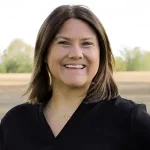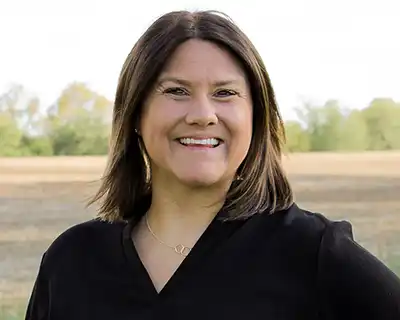Is there Enough Shared Risk to be Truly Effective?
Realizing that mitigating agriculture’s climate impact is too much for any one organization to tackle alone, the sustainability community is rallying around meaningful collaborations and partnerships to help get more conservation on the ground. Late last year, the annual 2023 Sustainable Agriculture Summit, sponsored by Field to Market, brought strategic partnerships into focus with its theme Scaling Collective Impact: Collaborating to Accelerate Agricultural Sustainability.
During the conference, Trust In Beef partner U.S. Roundtable for Sustainable Beef (USRSB) brought together a panel to discuss both the power and limitations of collaboration in this seminal moment for conservation agriculture, specifically through case studies told by various members of the beef value chain.
Producer-Centered Collaboration Is Key
Early in the discussion, Debbie Lyons-Blythe, Past Chair of USRSB and a Kansas Cattle Rancher at Blythe Family Farms, signaled what would be a central theme of the panel – the role of the producer in these value chain collaborations around sustainability.
“For me, the commitment to being a part of this movement is that it’s vital that the grower, producer, the farmer, or the rancher is involved from the beginning,” she told the audience. “That’s the foundation of collaboration.”
It turned out, much of the audience, which included members who spanned the value chain, also thought that sentiment was the foundation of collaboration.
In a follow-up poll, Samantha Werth, Executive Director, U.S. Roundtable for Sustainable Beef asked “who are your key collaborators?” and found that the majority of respondents valued producer collaboration in their process.
“Many of us who have been in this space for the last decade or more might say that maybe that wasn’t always the case,” said Werth.
Shared Missions Are Critical
This legacy of top-down collaboration from the value chain is what Trust In Food’s President, Amy Skoczlas Cole, said spurred their conservation program, Trust In Beef. In the panel, she shared that the collaboration’s goal is around actual shared mission instead of just providing support for producers.
“What we’ve done at Trust In Beef is say that we are going to set the mission, we’re going to put the producer at the heart of that, and we’re going to understand that it’s not enough that the producer feels okay or feels compensated. We actually are trying to bring in entire collaboration together so that producers who we’re working with on the ground feel like their goals are our goals. So, for those of who said you are collaborating with producers, I would ask, ‘do you really feel like you are sharing in that producer’s success?’ Because at Trust In Beef, that is what we are seeing it takes to actually start to move at scale for the opportunity that we have today.”
In practice, what Skoczlas Cole said what that looks like is entering the process with a deep understanding of what change looks like for each individual producer.
“Recognizing that every operation is different, every producer is different and understanding who are you trying to work with and answering the questions like, ‘What do I need to know about them deep in their gut of what forces are they facing?’ And it’s not enough to know how much money do we need to pay, but it has to pencil into other drivers, like do they have enough time, do they have enough energy to get the technical resources they need, do they have the people and the labor that they need, or is it sometimes that the status quo is okay and they don’t really see any need for change?”
According to Skoczlas Cole, Trust In Beef unites partners and their technical expertise around central needs of producers to help them take the next step in implementing practices on the ground.
“It might feel like a model that takes a lot of effort upfront, but what we’re seeing is we need to do that amount of work, and when you share that mission, it goes fast once you get going,” Skoczlas Cole said.
Finding Common Ground and Shared Risk Is Impactful
While it was encouraging for the panelists to see that producer collaboration was key in the audience poll, Lyons-Blythe shared concern in how that collaboration is taking place, namely as it relates to face-to-face interaction, which she says is critical to having actual impact at the farm-gate.
“If you have not had time with them face-to-face, you might as well just forget that you are collaborating with producers,” she said. “We are folks that live out in the country, we enjoy being face-to-face. You need to put your feet in their soil. You need to walk on their place and have face-to-face interaction. If you want to collaborate with producers, you have to meet them where they live.”
If creating a safe, shared space for the value chain to collaborate with producers is the foundation for success, the panelists agreed that sharing risk is the step that will prove the most beneficial to accelerating change.
“Here’s the deal for producers—they’re tired of being told that it’s all about them,” Lyons-Blythe said. “When I talk to other producers, the number one thing I tell them is it’s not all on the farm. Every sector has ways they can improve sustainability. Everybody is working towards the same things. Now the conversation has shifted so that you all are supporting the producers in the changes to make, and I think that’s vital.”
One of the areas in which shared risk needs to be developed, according to Skoczlas Cole, is around data collection, measuring, monitoring and reporting.
“We talk about the importance of data in today’s world,” she said. “Producers, in particular, are being asked for this tremendous amount of data, and we haven’t laid the groundwork that goes back to the shared risk and responsibility of that. So, we are getting questions like: ‘What is that data? How is it going to be used? How do I trust that you’re not going to use it against me?’ “That’s a broad category that I would say if we pick underneath it, you’ll see a disconnect between what one part of the value chain thinks they need to be successful, whether it’s the data science, the solution, the producer data, etc., and what the other part of the value chain understands to be its responsibility and opportunity in providing that.”
To make meaningful progress, coalitions need to build more shared understanding of what it’s going to take and what the future is going to look like so producers understand what farm-level data is needed and why it’s in their best interest to collect and share it.
“There’s some big barriers, and that’s one of them that we’ve got to work on to take the next step,” said Skoczlas Cole.



